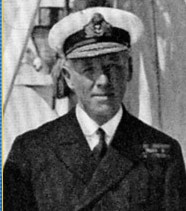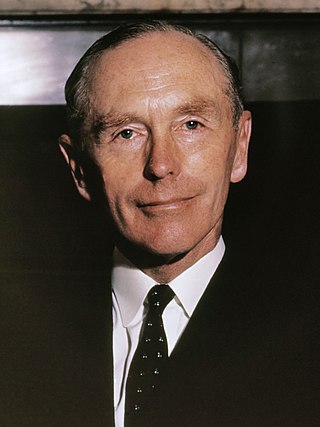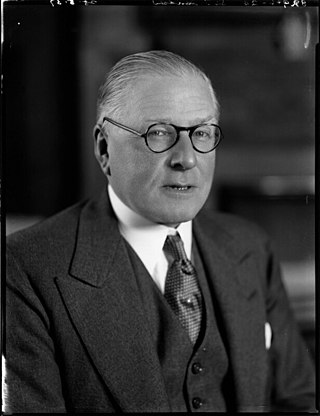
The Minister for Co-ordination of Defence was a British Cabinet-level position established in 1936 to oversee and co-ordinate the rearmament of Britain's defences. It was abolished in 1940.

The Minister for Co-ordination of Defence was a British Cabinet-level position established in 1936 to oversee and co-ordinate the rearmament of Britain's defences. It was abolished in 1940.
The position was established by Prime Minister Stanley Baldwin in response to criticism that Britain's armed forces were understrength compared to Nazi Germany. This campaign had been led by Winston Churchill, and many expected him to be appointed as the new minister, though nearly every other senior figure in the National Government was also speculated upon by politicians and commentators. Despite this, Baldwin's choice of the Attorney General Sir Thomas Inskip provoked widespread astonishment. A famous remark was "This is the most cynical appointment since Caligula made his horse a consul". [1] The appointment is now regarded as a sign of caution by Baldwin, who did not wish to appoint someone like Churchill who would have been interpreted by foreign powers as a sign of the United Kingdom preparing for war, as well as a desire to avoid taking on board a controversial and radical minister.
In 1939 Inskip was succeeded by First Sea Lord Lord Chatfield. When the Second World War broke out, the new prime minister Neville Chamberlain formed a small War Cabinet, and it was expected that Chatfield would serve as a spokesperson for the three service ministers, the Secretary of State for War, the First Lord of the Admiralty and the Secretary of State for Air; however political considerations resulted in all three posts being included in the Cabinet, and Chatfield's role proved increasingly redundant. In April 1940 the position was formally wound up and the functions transferred to other Ministers.
The following month Chamberlain was succeeded as prime minister by Churchill, who took the additional title of "Minister of Defence"; this was, however, a separate office from Minister for Coordination of Defence, though the two titles were frequently used interchangeably.
| Royal Navy | British Army | Royal Air Force | Co-ordination | |
| 1628 | First Lord of the Admiralty (1628–1964) | |||
| 1794 | Secretary of State for War (1794–1801) | |||
| 1801 | Secretary of State for War and the Colonies (1801–1854) | |||
| 1854 | Secretary of State for War (1854–1964) | |||
| 1919 | Secretary of State for Air (1919–1964) | |||
| 1936 | Minister for Co-ordination of Defence (1936–1940) | |||
| 1940 | Minister of Defence (1940–1964) | |||
| 1964 | Secretary of State for Defence (1964–present) | |||
| Minister | Term of office | Party | Ministry | |||
|---|---|---|---|---|---|---|
 | Thomas Inskip MP for Fareham (1876–1947) | 13 March 1936 | 29 January 1939 | Conservative | Baldwin III | |
| Chamberlain I | ||||||
 | Ernle Chatfield 1st Baron Chatfield (1873–1967) | 29 January 1939 | 3 April 1940 | Independent (National) | ||
| Chamberlain War | ||||||

Arthur Neville Chamberlain was a British politician who served as Prime Minister of the United Kingdom from May 1937 to May 1940 and Leader of the Conservative Party from May 1937 to October 1940. He is best known for his foreign policy of appeasement, and in particular for his signing of the Munich Agreement on 30 September 1938, ceding the German-speaking Sudetenland region of Czechoslovakia to Nazi Germany led by Adolf Hitler. Following the invasion of Poland on 1 September 1939, which marked the beginning of the Second World War, Chamberlain announced the declaration of war on Germany two days later and led the United Kingdom through the first eight months of the war until his resignation as prime minister on 10 May 1940.

Stanley Baldwin, 1st Earl Baldwin of Bewdley, was a British statesman and Conservative politician who dominated the government of the United Kingdom between the world wars. He was prime minister on three occasions, from May 1923 to January 1924, from November 1924 to June 1929, and from June 1935 to May 1937.

Alexander Frederick Douglas-Home, Baron Home of the Hirsel,, styled as Lord Dunglass between 1918 and 1951 and the Earl of Home from 1951 until 1963, was a British statesman and Conservative politician who was Prime Minister of the United Kingdom from 1963 to 1964. He was the last prime minister to hold office while being a member of the House of Lords, before renouncing his peerage and taking up a seat in the House of Commons for the remainder of his premiership. His reputation, however, rests more on his two stints as Foreign Secretary than on his brief premiership.

Douglas McGarel Hogg, 1st Viscount Hailsham, was a British lawyer and Conservative politician who twice served as Lord Chancellor, in addition to a number of other Cabinet positions. Mooted as a possible successor to Stanley Baldwin as party leader for a time in the very early 1930s, he was widely considered to be one of the leading Conservative politicians of his generation.

The secretary of state for defence, also known as the defence secretary, is a secretary of state in the Government of the United Kingdom, with responsibility for the Ministry of Defence. As a senior minister, the incumbent is a member of the Cabinet of the United Kingdom.

William Shepherd Morrison, 1st Viscount Dunrossil,, was a British politician. He was a long-serving cabinet minister before serving as Speaker of the House of Commons from 1951 to 1959. He was then appointed as the 14th Governor-General of Australia, in office from 1960 until his death in 1961.
A war cabinet is a committee formed by a government in a time of war to efficiently and effectively conduct that war. It is usually a subset of the full executive cabinet of ministers, although it is quite common for a war cabinet to have senior military officers and opposition politicians as members.

Sir Howard Kingsley Wood was a British Conservative politician. The son of a Wesleyan Methodist minister, he qualified as a solicitor, and successfully specialised in industrial insurance. He became a member of the London County Council and then a Member of Parliament.

Albert Victor Alexander, 1st Earl Alexander of Hillsborough, was a British Labour and Co-operative politician. He was three times First Lord of the Admiralty, including during the Second World War, and then Minister of Defence under Clement Attlee.

Thomas Walker Hobart Inskip, 1st Viscount Caldecote, was a British politician who served in many legal posts, culminating in serving as Lord Chancellor from 1939 until 1940. Despite legal posts dominating his career for all but four years, he is most prominently remembered for serving as Minister for Coordination of Defence from 1936 until 1939.

James Richard Stanhope, 7th Earl Stanhope,, styled Viscount Mahon until 1905, was a British Conservative politician.

Alfred Ernest Brown was a British politician who served as leader of the Liberal Nationals from 1940 until 1945. He was a member of Parliament and also held many other political offices throughout the Second World War.

Edward Leslie Burgin was a British Liberal and later Liberal National politician in the 1930s.

Philip Cunliffe-Lister, 1st Earl of Swinton,, known as Philip Lloyd-Greame until 1924 and as The Viscount Swinton between 1935 and 1955, was a prominent British Conservative politician from the 1920s until the 1950s. He was notable through the 1940s and 1950s as being firstly the Minister for Aviation, and then being on the steering committee for the Convention on International Civil Aviation. he retired from politics in 1955 and his status was raised to an earldom.

Henry David Reginald Margesson, 1st Viscount Margesson, PC was a British Conservative politician, most popularly remembered for his tenure as Government Chief Whip in the 1930s. His reputation was of a stern disciplinarian who was one of the harshest and most effective whips. His sense of the popular mood led him know when to sacrifice unpopular ministers. He protected the appeasement-supporting government as long as he could.

John Colin Campbell Davidson, 1st Viscount Davidson,, known before his elevation to the peerage as J. C. C. Davidson, was a British civil servant and Conservative Party politician, best known for his close alliance with Stanley Baldwin. Initially a civil servant, Davidson was private secretary to Bonar Law between 1915 and 1920. After entering parliament in 1920, he served under Baldwin as Chancellor of the Duchy of Lancaster between 1923 and 1924 and as Parliamentary and Financial Secretary to the Admiralty between 1924 and 1926. From 1926 to 1930 he was Chairman of the Conservative Party. He was once again Chancellor of the Duchy of Lancaster between 1931 and 1937, firstly under Ramsay MacDonald and from 1935 onwards under Baldwin. On Baldwin's retirement in 1937, Davidson left the House of Commons and was ennobled as Viscount Davidson. Despite being only 48, he never took any further active part in politics. His wife Frances, Viscountess Davidson, succeeded him as MP for Hemel Hempstead. Lord Davidson died in London in 1970.

The National Government of 1937–1939 was formed by Neville Chamberlain on his appointment as Prime Minister of the United Kingdom by King George VI. He succeeded Stanley Baldwin, who announced his resignation following the coronation of the King and Queen in May 1937.

Neville Chamberlain formed the Chamberlain war ministry in 1939 after declaring war on Germany. Chamberlain led the country for the first eight months of the Second World War, until the Norway Debate in Parliament led Chamberlain to resign and Winston Churchill to form a new ministry.

The post of Minister of Defence was responsible for co-ordination of defence and security from its creation in 1940 until its abolition in 1964. The post was a Cabinet-level post and generally ranked above the three service ministers, some of whom, however, continued to also serve in Cabinet.

The Churchill war ministry was the United Kingdom's coalition government for most of the Second World War from 10 May 1940 to 23 May 1945. It was led by Winston Churchill, who was appointed prime minister of the United Kingdom by King George VI following the resignation of Neville Chamberlain in the aftermath of the Norway Debate.